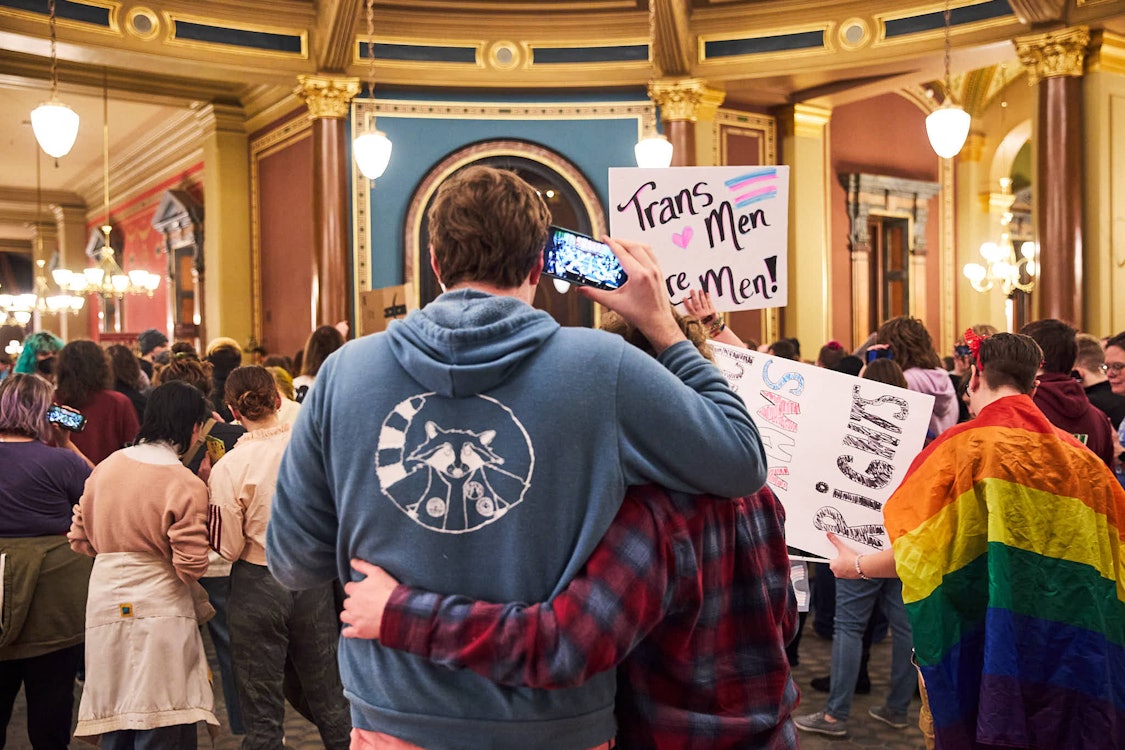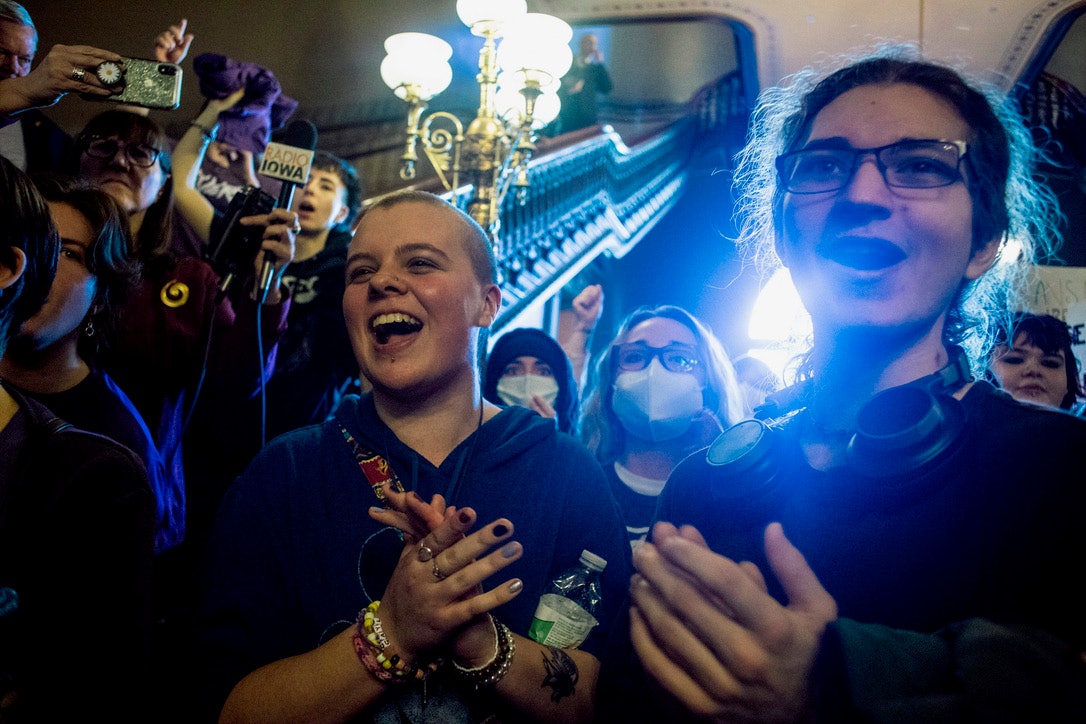The Iowa legislature adjourned on April 20, having approved no bills this year that specifically targeted LGBTQ Iowans. It was a marked contrast from the 2023 session, when Republican lawmakers and Governor Kim Reynolds enacted a ban on gender-affirming care for minors, a school “bathroom bill,” and an education law with several provisions adversely affecting LGBTQ students.
However, the LGBTQ community had to mobilize repeatedly against harmful bills moving through the legislative process this year. For that reason, One Iowa’s director of policy and advocacy Keenan Crow called the 2024 session “an extremely difficult one for LGBTQ Iowans.”
In addition, one GOP bill that has already become law and another awaiting the governor’s signature will make Iowa a less welcoming place for marginalized groups, including LGBTQ people. Expected changes to the Iowa Civil Rights Commission will hamper enforcement of the Iowa Civil Rights Act, which has prohibited discrimination on the basis of sexual orientation and gender identity since 2007.
BILLS THAT FAILED TO PASS
Only a few years ago, bills targeting the LGBTQ community rarely received a subcommittee hearing in the Iowa House or Senate. A relatively small number of legislators (none holding leadership roles) generated most of those proposals.
The “new normal” for the Iowa legislature is that such bills often get through the subcommittee stage and sometimes gain approval from a full committee.
As a result, representatives of the advocacy organizations One Iowa and Iowa Safe Schools came to many subcommittee hearings in January and February. The subcommittee is often the only opportunity for Iowans to speak for or against proposed legislation. On several days when anti-LGBTQ bills were scheduled for consideration, Iowans gathered in large numbers to make their voices heard in the capitol hallways and rotunda.
One Iowa Action maintained the most comprehensive public database of every bill introduced in 2023 or 2024 that “directly targets LGBTQ Iowans, will have a primary impact on LGBTQ Iowans, or was created as a response to misinformation about LGBTQ Iowans.” This post focuses on bills introduced this year.
Advanced from committee
Five proposals received committee approval in time for the legislature’s first “funnel” deadline in February. However, House and Senate leaders did not bring them up for a vote in the full chamber.
The governor’s office introduced a sweeping bill to codify “separate but equal” treatment of transgender Iowans and define various terms in ways that would erase or exclude LGBTQ people. Before committee approval of House Study Bill 649 (renumbered House File 2389), Republicans removed a provision that would have required driver’s licenses for transgender people to display the sex assigned at birth as well as the person’s current sex designation. They left in place language requiring such information on birth certificates.
State Representative Henry Stone introduced a bill that would ban schools from disciplining staff, contractors, or students “for the use of legal names or for the failure to provide personal pronouns.” (House File 2139, renumbered House File 2396)
State Representative Bill Gustoff proposed what was perhaps the strangest bill, prohibiting foreign language instruction that incorporated “gender-neutral language” if the world language “utilizes a grammatical gender system.” (House File 2060, renumbered as House File 2548) Gustoff asserted during a subcommittee hearing that educators had contacted him, fearing they would be disciplined for refusing to teach gender-neutral language. He declined to name the school districts, and I was unable to find evidence any school had adopted such a policy. It sounds more like the infamous “litter box” hoax than something occurring in real life.
Iowa Senate Judiciary Committee chair Brad Zaun introduced Senate Study Bill 3084 (renumbered Senate File 2263), which would force transgender incarcerated people to use facilities that correspond with their sex assigned at birth, not their gender identity.
Zaun also proposed a broad-based religious exemption for health care providers (both individual and institutional) to refuse to offer certain services or non-emergency care. The original bill (Senate Study Bill 3006) would have extended religious or “conscience” exemptions to health insurers as well. Following committee passage of the bill (renumbered Senate File 2286), a Republican amendment was prepared to strike out language applying to insurers.
Advanced from subcommittee
Three bills advanced from a House or Senate subcommittee but were never brought up for a full committee vote.
State Senator Sandy Salmon proposed making it a crime to expose a minor to an “obscene performance,” and allowing parents to file civil suits alleging someone had exposed their child to obscene material. (Senate File 2176)
Salmon also introduced a bill to prohibit local governments from banning conversion therapy. (Senate File 2037)
State Representative Skyler Wheeler introduced a one-sentence bill (House Study Bill 588) defining “woman” in Iowa Code as “an adult female human.” The bill was referred to the Education Committee, which Wheeler chairs, but for some reason, he did not put it to a committee vote. Incidentally, Wheeler’s preferred definition conflicts with the abortion ban Iowa Republicans approved last July, which uses “woman” to describe any pregnant person, regardless of age.
Failed to clear the first hurdle
The majority party rarely convenes a subcommittee on a bill unless there is support to move it forward. But as Bleeding Heartland discussed in more detail here, a House Judiciary subcommittee consisting of two Republicans and a Democrat unanimously rejected House File 2082, State Representative Jeff Shipley’s proposal to remove gender identity protections from the Iowa Civil Rights Act. That bill would also have redefined gender dysphoria as a disability subject to some civil rights protections.
Three more anti-LGBTQ bills introduced this year did not receive a subcommittee hearing.
Salmon’s Senate File 2129 purported to declare that the federal Respect for Marriage Act (requiring states to give full faith and credit to same-sex marriages) is “null and void” and has “no effect whatsoever in Iowa.”
Another Salmon special, Senate File 2055, would have imposed a statewide ban on transgender people using restrooms, changing rooms, or other facilities that align with their gender identity.
Shipley attempted to add new mandatory topics to the social studies curriculum, including inaccurate negative information about gender-affirming care. But House File 2068 was never even assigned to a subcommittee.
It was clear by the second “funnel” deadline on March 15 that all of the above proposals were going nowhere. But LGBTQ advocates would have one more battle to fight.
LATE ANTI-TRANS AMENDMENT THWARTED
Policy bills that miss the Iowa legislature’s funnel deadlines are ineligible for floor debate—in theory. Vigilance is warranted, because every year, some “dead” proposals come back to life as provisions in a spending bill, or amendments to other legislation.
So it was with Senate File 2430, an uncontroversial bill extending the time frame for correcting the cause of death on death certificates. The bill was designed to address a barrier for surviving relatives who would otherwise be entitled to certain state or federal veterans’ benefits. The Senate approved it unanimously on April 9.
State Representative Phil Thompson (himself a veteran) was assigned to floor manage this bill in the House. On April 19—widely understood to be the final day of the 2024 session—he filed an amendment that would change code sections on issuing new or substitute birth certificates to require such documents to display a person’s sex assigned at birth. An Iowa Safe Schools action alert warned, “This amendment will impair transgender Iowans from changing their birth certificate as allowed under current law.” (emphasis in original)
When the House debated the bill that evening, Thompson asked for unanimous consent to withdraw his amendment. It’s unclear whether he pulled the amendment because House Republicans didn’t have the votes to pass it, or out of concern the Senate might not take up an amended bill before adjourning for the year. Thompson did not respond to Bleeding Heartland’s email seeking clarification. The House unanimously voted to send the unchanged death certificate bill to the governor.
TWO POTENTIALLY DISCRIMINATORY LAWS PASSED
In early April, Reynolds signed Senate File 2095, which proponents call the “Religious Freedom Restoration Act” (RFRA) and detractors dubbed the right to discriminate bill. The law stipulates that state and local governments in Iowa “shall not substantially burden a person’s exercise of religion,” unless the government can show its regulation is grounded in a “compelling” interest and uses the “least restrictive means” to advance that interest.
During the Senate debate on the legislation, State Senator Jason Schultz denied it would be used against LGBTQ people. But many Iowans expect Christian conservatives to invoke the law as an excuse to deny services or accommodations to individuals in some protected classes. Republicans in both chambers approved RFRA on straight party-line votes.
Compounding concerns about threats to civil rights, Reynolds is sure to sign Senate File 2385, a lengthy bill on state boards and commissions. As Ralph Rosenberg explained, that measure will restrict the Iowa Civil Rights Commission’s ability “to follow up on evidence of discriminatory patterns or practices or to proactively investigate discrimination and to engage in preventative efforts, such as testing for discriminatory practices.”
Republicans dealt one last blow to marginalized Iowans through the education appropriations bill, Senate File 2435, which received final approval hours before the end of session. Negotiators agreed on an amendment that incorporated a House Republican proposal to restrict diversity, equity, and inclusion (DEI) programs at state universities. Several LGBTQ college and graduate students came to a House subcommittee earlier in the year to plead with legislators not to pass a bill containing similar language.
Assuming Reynolds does not item-veto Division IX when she signs the education funding bill, Iowa’s state universities will be forced to shut down DEI initiatives that are not required for accreditation or to comply with state or federal law. The Iowa Board of Regents (the governing body for the universities) approved that approach to DEI last year, but codifying the language will make it harder to reverse course if a new governor appoints board members who value diversity.
Becky Tayler, executive director of Iowa Safe Schools, said in a statement following the legislature’s adjournment on April 20,
Iowa Safe Schools was proud to continue defending the rights of LGBTQ youth this legislative session, resulting in every explicitly anti-LGBTQ bill being defeated. Unfortunately, dramatically expanded religious exemptions in SF 2095 will surely be used to discriminate against LGBTQ individuals and other marginalized Iowans. Our organization will keep fighting until all LGBTQ students feels safe and supported in their schools, communities, and homes across Iowa.
One Iowa’s Keenan Crow struck a similar tone in a statement provided to Bleeding Heartland.
The end of the 2024 legislative session means a temporary end to legal threats to LGBTQ equality in Iowa.
Make no mistake, the 2024 session was an extremely difficult one for LGBTQ Iowans. 40 anti-LGBTQ bills were eligible for debate and nearly half of those received hearings. Of those, two passed: the Religious Freedom Restoration Act (RFRA) and a codification of the anti-DEI policies at Regents institutions. While neither were targeted exclusively at LGBTQ Iowans, they both will undoubtedly have impacts on the community.
The DEI restrictions will convince young people not to choose Iowa in the first place, while RFRA will convince others who have already chosen Iowa as a home to leave. RFRA will undoubtedly be utilized in the coming months by those who want to discriminate against LGBTQ Iowans, single mothers, and those with religious views other than Christianity. We can only hope that Iowa courts recognize that anti-discrimination protections meet the highest burdens of legal scrutiny.
Crow acknowledged that the 2024 session could have done far more damage.
That said, while we faced a barrage of discriminatory bills, we have been sincerely humbled by the ability of our community to come together when there is a serious threat. Over and over again, we showed up together and stopped heinous legislation. From the bill to remove the civil rights of trans Iowans, to the LGBTQ Erasure Act [the governor’s proposed bill], to the last-second attack on birth certificates; so many proposals aren’t law today because of what we were able to accomplish together. Despite the ongoing attack on LGBTQ rights, the LGBTQ community remains strong and committed to equality for all.
I was at the capitol during several of this year’s rallies and was struck by the atmosphere of determination and solidarity. People were understandably angry about having to fight dehumanizing and discriminatory bills. But they also supported each other and shared moments of celebration.

Iowans protest anti-LGBTQ bills (photo by Joe Crimmings)

photo by Joe Crimmings

Iowans celebrate the defeat of Jeff Shipley’s attempt to remove gender identity from the Iowa Civil Rights Act (photo by Greg Hauenstein)

(photo by Greg Hauenstein)

